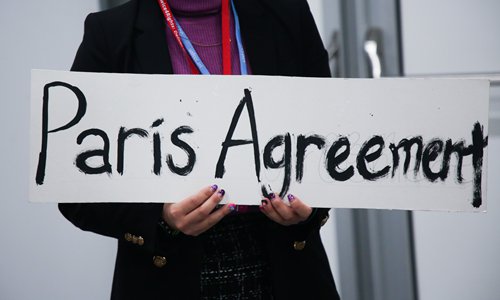HOME >> OPINION
US withdrawal from Paris Agreement shows it is an untrustworthy partner
By Li Haidong Source:Global Times Published: 2019/11/11 21:58:40

Photo: IC
The Trump administration has formally notified the United Nations (UN) that the US is withdrawing from the Paris Agreement, marking the first formal step in a one-year process to exit the global pact to fight climate change.The Trump administration has five main considerations on quitting the agreement.
First, although global warming is generally recognized by most scientists in the world, Trump thinks that climate change is a pseudoscience and does not believe in such a reality.
Second, the US government thinks the Paris Agreement is an unfair treaty. The pact puts forward the principle of "common but differentiated responsibilities and respective capabilities," which requires developed countries to provide more contributions, such as technical and financial support, to developing countries. Trump thinks this agreement takes advantage of the US.
Third, the withdrawal is supported by powerful domestic lobbying groups in the US, such as oil and fossil fuel groups, which have strong influence on the Trump administration.
Fourth, this is also the result of the struggle between major political parties in the US. While the Democratic Party has been actively advocating for climate change agreements, the Republicans have been relatively muted on this issue.
Last, emerging powers, such as China and India, are gaining greater leadership in the context of global climate change.
The US believes that it has been restrained by these countries and has lost its "freedom of movement."
The US withdrawal from the Paris Agreement, which is an essential treaty for the sake of the environment and all of humanity, will undoubtedly damage its national image, particularly given the fact that many of its allies, such as France, are advocating for the climate accord.
More than 190 countries have adopted the Paris Agreement, but only the US, a major emitter of carbon dioxide and also one of the major countries that cause climate change, has rejected it.
Aside for the Paris Agreement, the US has also pulled out of other international organizations, including the UN Human Rights Council, UNESCO, and the Intermediate-Range Nuclear Forces Treaty between the US and Russia.
The retreat from those organizations and agreements demonstrates the US is not a trustworthy partner and allows the world to observe US unilateralism and its arbitrary, irresponsible and hegemonic image.
Although the Trump administration has filed paperwork to withdraw the US from the Paris Agreement, the majority of US society share a different opinion on the issue of climate change.
A 2018 survey by the Yale Program on Climate Change Communication found that 77 percent of Americans believed the US should remain in the Paris Agreement, including 60 percent of Republicans. Among registered voters, 66 percent said they opposed Trump's decision to pull out of the Paris deal.
In addition, the State Department's letter to UN Secretary-General Antonio Guterres sets the process of withdrawal to be complete one day after the 2020 US presidential election, and the top Democratic presidential contenders have promised to re-engage in the accord if they win.
Actually, former US president Barack Obama signed to join the Paris Agreement in 2016, but the US Congress did not approve it, reflecting the complicated decision-making process of the country. Even if the Democratic Party comes to power, the US Congress will impose restrictions on its decision to join the agreement as well.
The US polity determines the uncertainty and unpredictability of its foreign policies, some of which are increasingly outdated on certain international issues.
Contrary to the US, China's policies on global issues have always been committed and sustained.
China should strengthen its own mechanisms to deal with climate change, such as taxing carbon emissions and strengthening cooperation with other countries under the UN framework, to establish the image of a major responsible and reliable country.
The author is professor at the Institute of International Relations, China Foreign Affairs University. opinion@globaltimes.com.cn
RELATED ARTICLES:
Posted in: VIEWPOINT